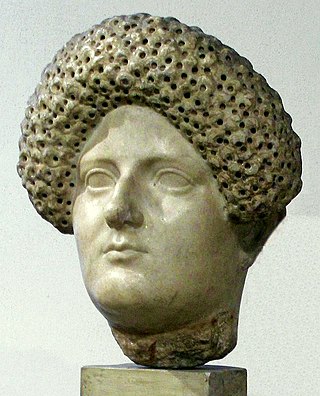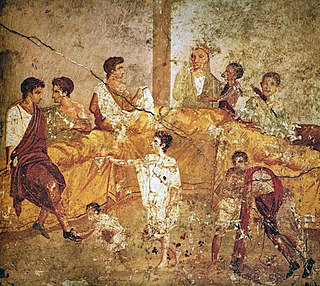Related Research Articles
Gnaeus Domitius Afer was a Roman orator and advocate, born at Nemausus (Nîmes) in Gallia Narbonensis. He flourished in the reigns of Tiberius, Caligula, Claudius and Nero. He was suffect consul in the nundinium of September to December 39 as the colleague of Aulus Didius Gallus.

Domitia Longina was a Roman empress and wife to the Roman emperor Domitian. She was the youngest daughter of the general and consul Gnaeus Domitius Corbulo. Domitia divorced her first husband, Lucius Aelius Lamia Plautius Aelianus in order to marry Domitian in AD 71. The marriage produced only one son, whose early death is believed to have been the cause of a temporary rift between Domitia and her husband in 83. She became the empress upon Domitian's accession in 81, and remained so until his assassination in 96. She is believed to have died sometime between AD 126 and 130.

Calvisia Domitia Lucilla, was a noble Roman woman who lived in the 2nd century. She is best known as the mother of the Roman Emperor Marcus Aurelius.

Vistilia was a Roman matron of the gens Vistilia known by her contemporaries for having seven children by six different husbands; Pliny the Elder was more impressed by the fact most of her pregnancies were remarkably brief. Five of her sons became consuls, her daughter Milonia Caesonia became Roman empress through her marriage to Caligula, and her granddaughter Domitia Longina became empress through her marriage with Domitian. Due to her fertility Vistilia became a byword for prodigious fecundity in antiquity.
Gaius Julius Cornutus Tertullus was a Roman senator who was active during the late 1st and early 2nd centuries. He is best known as the older friend of Pliny the Younger, with whom Cornutus was suffect consul for the nundinium of September to October 100.
Gaius Salvius Liberalis Nonius Bassus was a Roman senator and general, who held civil office in Britain and was a member of the Arval Brethren. He was suffect consul in the last nundinium of 85, with Cornelius Orestes as his colleague.
Gnaeus Pinarius Cornelius Clemens was a Roman military officer and senator who was appointed Suffect consul during the reign of Vespasian. He is primarily known through inscriptions.
Lucius Catilius Severus Julianus Claudius Reginus was a Roman senator and general active during the reigns of Trajan and Hadrian. He was appointed consul twice: the first time in 110 CE with Gaius Erucianus Silo as his colleague; the second in the year 120 with the future emperor Antoninus Pius as his colleague. Catilius was also the step-great-grandfather of the emperor Marcus Aurelius.
The gens Minicia was a plebeian family at ancient Rome. Members of this gens are first mentioned in the first century, achieving the consulate under the emperor Claudius. Owing to the similarity of their names, the Minicii are regularly confused with members of the ancient and far more prominent gens Minucia.
Marcus Cornelius Nigrinus Curiatius Maternus was a Roman senator and general during the reign of Domitian. He was suffect consul during the nundinium of September to October AD 83 with Lucius Calventius Sextus Carminius Vetus. Although some experts consider him a rival with Trajan as heir apparent to the emperor Nerva, he is primarily known from inscriptions.
Titus Prifernius Geminus was a Roman senator who lived in the second century. He is best known as a friend and correspondent of Pliny the Younger, who addresses him as Geminus; he served as quaestor to Pliny for the latter's consulship in AD 100, and five letters Pliny wrote to Geminus have survived. Although the letters convey a genuine friendship between the two, the first one appears only in the latter books of Pliny's collection; Ronald Syme explains this may be due to the fact that he, like Quintus Corellius Rufus and Calestrius Tiro, were living in Rome at the same time.
Aulus Bucius Lappius Maximus was a Roman senator who flourished during the Flavian dynasty; Brian W. Jones considers him one of Domitian's amici or advisors. He held the consulate twice.
Lucius Julius Marinus Caecilius Simplex was a Roman senator who held several posts in the emperor's service. Simplex was then appointed suffect consul in late 101, with Lucius Arruntius Stella as his colleague. His career is primarily known through inscriptions.
Gaius Calpetanus Rantius Quirinalis Valerius Festus was a Roman senator, general, and amicus to each of the Flavian emperors. He proved his value to the Flavians when, as legatus legionis, or commander, of Legio III Augusta stationed in Africa, he assassinated the proconsul, who favored a rival of Vespasian during the Year of Four Emperors. He maintained his loyalty through the reigns of his sons Titus and Domitian, but fell out of favor during the latter's reign and was forced to commit suicide.
Galeo Tettienus Severus Marcus Eppuleius Proculus Tiberius Caepio Hispo was a Roman senator active in the late 1st and early 2nd centuries AD, who occupied a number of offices in the imperial service. He was suffect consul around the year 101 as the colleague of Rubrius Gallus.
Quintus Fabius Postuminus was a Roman senator who was suffect consul in the nundinum of May to August 96 with Titus Prifernius as his colleague.
Gnaeus Domitius Tullus was a Roman senator and military commander active in the first century AD. His full name is Gnaeus Domitius Curvius Tullus. He was twice suffect consul: the first time between 76 and 79; the second time for the nundinium of 13 to 31 January 98 as the colleague of Trajan.
Publius Glitius Gallus was a Roman senator active in the late 1st century AD. He was suffect consul at some yet undetermined nundinium in the first century.
Titus Curtilius Mancia was a Roman senator, who held several offices in the emperor's service during the middle of the first century. He was suffect consul in the nundinium of November to December 55 as the colleague of Gnaeus Cornelius Lentulus Gaetulicus. No other senator with his gentilicium is known, so Mancia seems to have been a homo novus.
The gens Curvia was a minor Roman gens, best known for being among the ancestors of Marcus Aurelius.
References
- ↑ Attested in CIL XI, 5210 = ILS 990
- ↑ Paul Gallivan, "The Fasti for A. D. 70-96", Classical Quarterly , 31 (1981), pp. 208, 219
- ↑ So Olli Salomies explains (Salomies, Adoptive and polyonymous nomenclature in the Roman Empire, (Helsinki: Societas Scientiarum Fennica, 1992), pp. 37f; Curvius Tullus is attested in CIL VI, 1772 (= ILS 1230)
- ↑ Acta Instituti Romani Finlandiae. Vol. 9. 1975. p. 36.
- ↑ Pliny, Epistulae , VIII.18.5-6
- ↑ CIL XI, 5210; IRT 527
- ↑ Richard Talbert, The Senate of Imperial Rome (Princeton: University Press, 1984), p. 16
- ↑ Eck, "Jahres- und Provinzialfasten der senatorischen Statthalter von 69/70 bis 138/139", Chiron , 12 (1982), pp. 287-292
- ↑ Eck has collected a list of the men known to have been adlected by Vespasian and Titus, Senatoren von Vespasian bis Hadrian (Munich: Beck'sche, 1970), pp. 108f
- ↑ Eck, "Jahres- und Provinzialfasten", p. 309
- ↑ Pliny, Epistulae, VIII.18.4
- ↑ Anthony Birley, Marcus Aurelius (London: Routledge, 1987), p. 29
- ↑ DOMITIA LONGINA: AN UNDERESTIMATED AUGUSTA (c. 53-126/8). p. 242